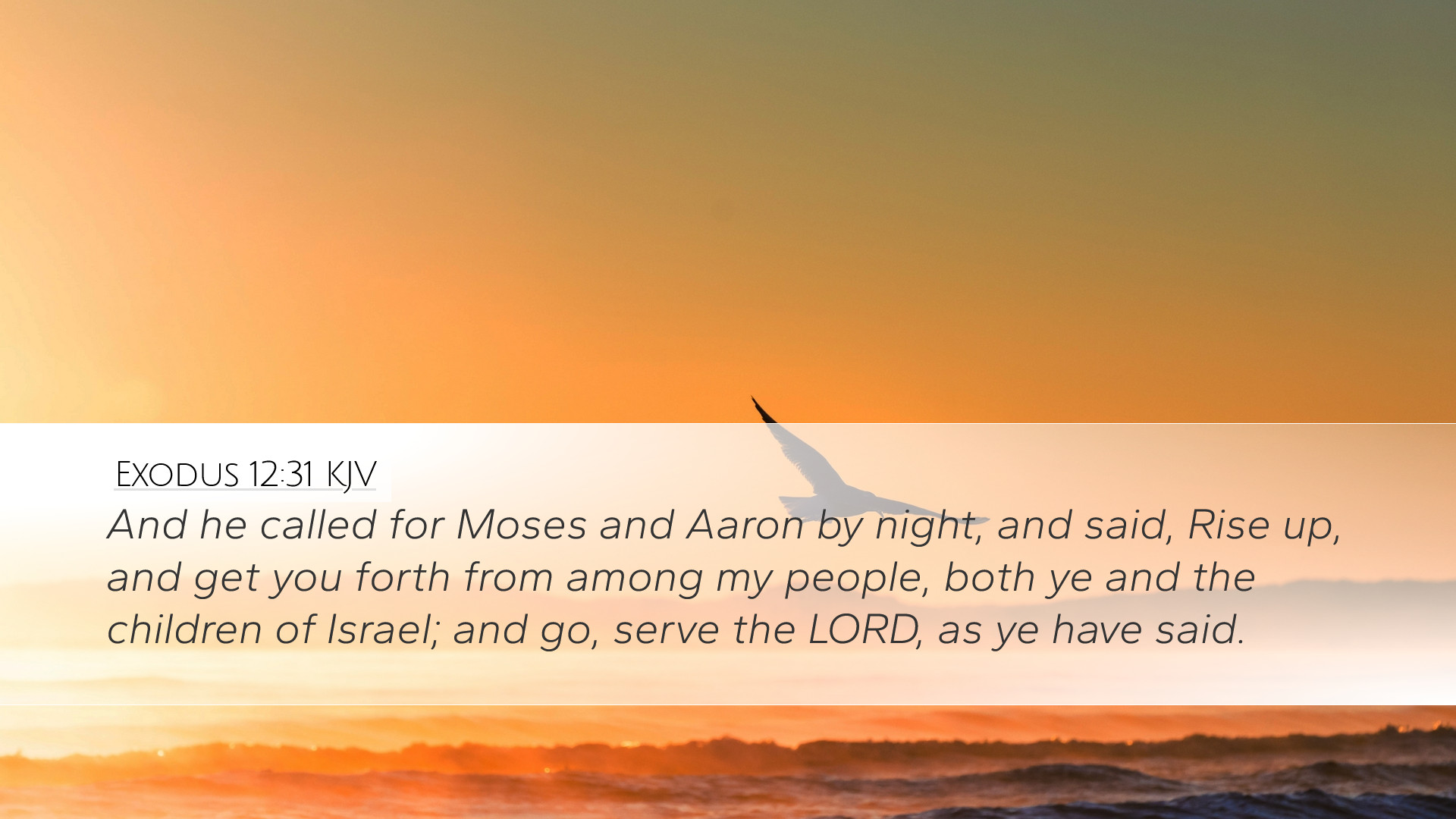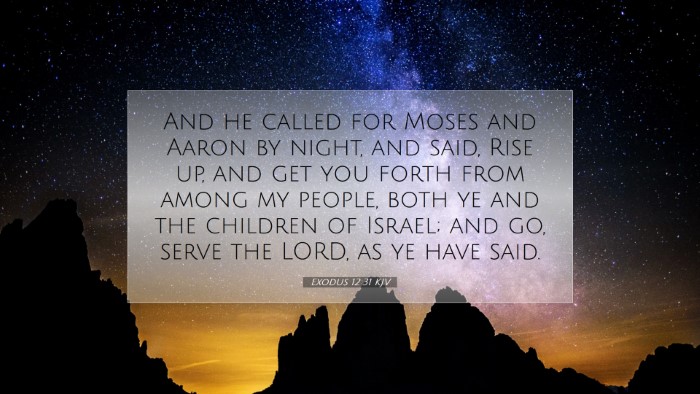Commentary on Exodus 12:31
Exodus 12:31 states: "And he called for Moses and Aaron by night, and said, Rise up, and get you forth from among my people, both ye and the children of Israel; and go, serve the LORD, as ye have said."
Introduction
This pivotal moment in Exodus marks a significant turning point in the narrative of the Israelites' deliverance from Egypt. Public domain commentaries provide valuable insights into the theological, historical, and literary significance of this verse. The urgency in Pharaoh's command reflects the culmination of the plagues, leading to Israel's liberation.
Theological Significance
The command given by Pharaoh to Moses and Aaron symbolizes the sovereignty of God over rulers and nations. As Adam Clarke notes, this moment highlights the power of God to fulfill His promises, as the dramatic liberation of Israel aligns with the covenant made to Abraham, Isaac, and Jacob.
- Divine Sovereignty: This verse serves as a reminder that God's will prevails over human authority. It illustrates how even Pharaoh, the most powerful man in Egypt, could not withstand the command of God.
- God’s Faithfulness: As Matthew Henry points out, this event showcases the fulfillment of God’s plan for Israel’s liberation, signifying His faithfulness and commitment to His people.
- Judgment and Mercy: The dual themes of judgment for Egypt and mercy for Israel are prevalent. Pharaoh’s desperate plea signifies the consequences of disobedience to God.
Historical Context
Understanding the historical context of Exodus 12 helps to unravel the significance of this moment. Albert Barnes emphasizes that this verse occurs immediately following the death of the firstborn of Egypt, foreshadowing both judgment and deliverance.
- Night of Judgment: The events unfold during the night, marking the severity of God’s judgment on Egypt. This darkness contrasts with the protection bestowed upon Israel.
- Urgency of Action: Pharaoh’s command reflects a sense of urgency that illustrates the breaking point of Egypt’s resistance. The Israelites are to depart immediately for the service of the LORD.
- Cultural Transition: This moment represents a transition for the Israelites from bondservants to a chosen nation, embarking on a journey toward the Promised Land.
Linguistic Insights
The Hebrew text of Exodus 12:31 can provide additional layers of meaning. Adam Clarke discusses the implications of the verbs used in the command "Rise up, and get you forth." These phrases convey a strong imperative, emphasizing the necessity for immediate obedience.
- Imperative Verbs: The use of imperative verbs suggests not just a request but an authoritative command, indicating the critical nature of the situation.
- Servitude to Freedom: The transition from serving Pharaoh to serving the LORD highlights a fundamental shift in identity for the Israelites.
Application for Today
The implications of Exodus 12:31 resonate deeply with modern audiences, particularly for pastors and scholars. The call to "serve the LORD" offers a contemporary challenge for believers to evaluate their allegiance and service in a world filled with competing authorities.
- Call to Action: Believers today are called to respond to God’s deliverance with active service and obedience. Just as Israel was to rise and leave Egypt, so are Christians called to rise above the bondage of sin.
- Understanding Deliverance: This passage invites reflection on the theme of redemption, encouraging a deeper understanding of how God delivers His people from spiritual oppression.
- Leadership Lessons: For pastors, this moment reinforces the importance of spiritual leadership in guiding others toward freedom in Christ, making the exhortation to serve relevant in today’s ministry contexts.
Conclusion
Exodus 12:31 encapsulates a profound moment of divine intervention in history. As both theologians and students reflect on this verse, the insights drawn from public domain commentaries emphasize the power of God’s sovereignty, the urgency of obedience, and the call to serve faithfully. The narrative not only recounts historical events but serves as a template for understanding God’s ongoing work in the lives of His people.


